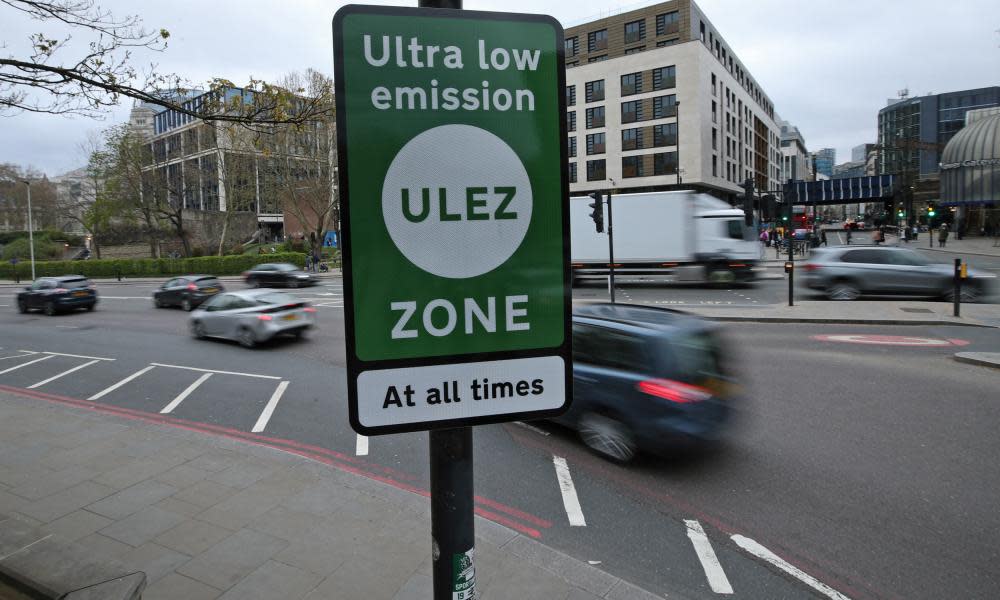Sunak urged to distance himself from Tories who dismiss air pollution risks

World-leading air pollution scientists have called on Rishi Sunak to distance himself from Conservative colleagues who are dismissing the facts on the serious health risks of toxic air.
In a letter, Prof Frank Kelly and 35 other prominent air pollution scientists call on the prime minister to tell his colleagues not to endorse “merchants of doubt” who “undermine the factual and truth foundations of life.”
Conservative MPs including Sunak and the former prime minister Boris Johnson have backed an increasingly high-profile campaign against the expansion of the ultra-low emission zone to all London boroughs in August. Some have questioned the need for the clean air zone to be expanded, saying there is no problem with air pollution in their areas.
In the letter to Sunak, Kelly said the evidence-based facts on the contribution of poor air quality to asthma, strokes, heart attacks, cancer and dementia had been uncovered by UK scientists.
But Conservatives have questioned and discredited those facts “in an attack on the very essence of our scientific community”.
“A collapse in trust in the scientific process would be a disaster,” the open letter to Sunak said. “We urge you to disassociate from the merchants of doubt and, in no uncertain terms, to tell your party colleagues to not endorse them or emulate their pervasive clams that sow cynicism and undermine the factual and truth foundations of life.”
The London mayor, Sadiq Khan, argues the city cannot afford to not stop people “breathing in poison”, with 4,000 premature deaths a year from toxic air in the capital.
The Ulez will be expanded on 29 August to take in outer London boroughs. Its extension is being challenged in court by five Conservative councils: the boroughs of Bexley, Bromley, Harrow and Hillingdon, and Surrey.
The rollout of the scheme comes with a £110m fund from Khan’s City Hall to help the poorest scrap older, polluting cars, which will attract a fee of £12.50 each day for travel in outer London.
Kelly pointed out that the government had not provided any funding to subsidise the poorest to scrap their vehicles.
UK scientists have led the field on exposing the dangers of toxic air pollution. In 2016, a joint report from the Royal College of Physicians and Royal College of Paediatrics and Child Health estimated that the equivalent of 40,000 deaths was attributable to outdoor air pollution every year in the UK.
In December 2020, after the inquest into the death of nine-year-old Ella Adoo-Kissi-Debrah, air pollution exposure was listed as a cause of death for the first time in the UK.
Philip Barlow, the inner south London coroner, said the schoolgirl was exposed to nitrogen dioxide and particulate matter (PM) pollution in excess of World Health Organization guidelines, the principal source of which were traffic emissions.
In his prevention of death report, the coroner warned more people would die of toxic air if no action was taken. “There was no dispute at the inquest that atmospheric air pollution is the cause of many thousand premature deaths every year in the UK. Delay in reducing the levels of atmospheric air pollution is the cause of avoidable deaths,” he said.
Barlow said WHO guidance levels for particulate matter – PM pollution – should become the legal limits in the UK to reduce the number of air pollution deaths but warned there was no safe limit for particulate pollution.
Despite the evidence of harm, Sunak has endorsed campaigning from his MPs, London councillors and assembly members against the expansion of the Ulez to cut air pollution in London. He said the Tories should not stop the campaign against the expansion of the clean air zone to the outer London boroughs. At prime minister’s questions he urged the mayor of London to scrap the expansion.
The letter to Sunak is signed by world-leading experts on the dangers of air pollution, including Prof Sir Stephen Holgate, whose research led to a new inquest into Ella’s death, Dr Gary Fuller of Imperial College London and Dr Martin Clift of Swansea University.
The first expansion of the Ulez in 2021 to an area 18 times the size of the original zone cut the numbers of polluting vehicles by 60% – from 124,000 to 50,000 a day. According to a City Hall report in February, harmful pollution levels in central London have reduced by 46% compared against a scenario without the Ulez. The scheme brought a 56% reduction in nitrogen dioxide levels in central London, 47% in inner London, and 37% in outer London, compared with levels in 2017.
Kelly said if the Ulez was not expanded into outer boroughs it would put the fight to clean up London’s air back by 10 years.
“There are obviously challenges in terms of helping people who need to replace their vehicles,” he said. “The fact is the government has not provided any funding to help Londoners in that respect.”
Neil Garratt, leader of the City Hall Conservatives, said: “We have been clear in our commitment to reducing air pollution and tackling climate change. The authors of the letter ask us to disavow false claims and the individuals making them, but they do not tell us which individuals or claims. The Ulez expansion would produce only a small change in air quality according to the Mayor’s own independent analysis, which we must balance against the severe financial impact for those hit by the mayor’s charge. It is irresponsible for anyone to conflate opposition to the Ulez expansion with science denial.”

 Yahoo News
Yahoo News 
